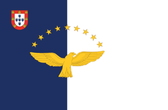
Call 0330 880 3600 Calls may be monitored or recorded. Opening Times.
- TRAVEL INSURANCE
- COVID-19 COVER
- More Options
- Help & Advice
- Existing Customers

Call 0330 880 3600 Calls may be monitored or recorded. Opening Times.

Need help?
UK Customer Services0330 880 3600*
Open Monday to Friday 9:00am to 6pm, Saturday 8:30am to 4pm and closed Sundays.
*Calls are recorded for training and quality purposes.

Official name: Autonomous Region of the Azores
Capital cities: Ponta Delgada, Angra do Heroísmo, Horta
Official language: Portuguese
Population: Around 246,000
Currency: Euro (EUR)
Time zone: GMT-1
Driving side: Right
Climate: Mild oceanic climate, with frequent rain and high humidity
The Azores, an archipelago of nine volcanic islands in the mid-Atlantic, form part of Portugal. Famed for dramatic scenery, crater lakes, geothermal springs and lush green landscapes, the islands are a paradise for hikers, whale watchers, and travellers seeking a slower pace away from Europe’s busier resorts.
The islands range from rugged volcanic peaks and black-sand beaches to pastoral farmland and charming coastal towns. Mount Pico, Portugal’s highest peak at 2,351 m, dominates Pico Island. The climate is mild year-round, averaging 11°C in winter and 26°C in summer. Frequent rainfall keeps the islands green but can make the weather feel humid.
Crime levels are low, though petty theft can happen in tourist areas. Inter-island travel is by plane or ferry, but schedules are weather dependent. Roads are generally good and hiring a car is the best way to explore at your own pace. Driving is on the right-hand side.
As part of Portugal, the Azores follow Schengen rules. British nationals and most visitors from outside the EU can enter visa-free for up to 90 days in any 180-day period. Passports should be valid for the duration of your stay. Longer stays require registration with local authorities.
The currency is the euro (EUR). Credit and debit cards are widely accepted in towns, but cash is handy in smaller villages and on the less populated islands. ATMs are available, though less frequent in rural areas. Any amounts over €10,000 must be declared when entering or leaving the EU.
Hospitals and clinics on the larger islands provide modern care, but serious cases may require transfer to mainland Portugal. Pharmacies are common, though travellers should bring any essential medication with them. Tap water is safe to drink. No special vaccinations are required beyond routine jabs. Comprehensive travel insurance, including medical cover, is strongly recommended.